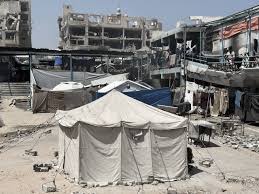Understanding the Current Situation in Gaza

Introduction
The situation in Gaza has been a focal point of international concern for decades. With recent escalations in violence, understanding the dynamics at play is crucial for grasping the broader implications for peace and security in the region. This article delves into the ongoing developments in Gaza, examining the humanitarian crisis and international responses.
Current Developments
As of late 2023, Gaza is experiencing one of its most severe crises. Following recent hostilities, reports indicate significant casualties and extensive destruction of infrastructure. The United Nations has classified the humanitarian situation as dire. Basic resources such as water, food, and medical supplies are in short supply, affecting hundreds of thousands of residents.
In response to the escalating violence, various international organizations have called for a ceasefire and increased humanitarian aid. Human Rights Watch and Amnesty International have documented numerous cases of potential war crimes, emphasizing the urgent need for accountability and protection of civilians. Concurrently, discussions at the United Nations have intensified, with member states debating possible resolutions aimed at promoting peace and stability in the region.
International Response
Global reactions to the situation in Gaza vary significantly. Countries in the Middle East have expressed solidarity with Palestinians, while Western nations have urged both sides to exercise restraint. The United States, while advocating for Israel’s right to defend itself, has also stressed the necessity of protecting civilian lives, reflecting a complex geopolitical relationship that complicates the pathway to peace.
In addition, grassroots movements and protests advocating for Palestinian rights have gained momentum across various continents, highlighting the growing global awareness and the call for a resolution to the conflict.
Conclusion
The situation in Gaza remains a critical issue with far-reaching implications. As humanitarian needs escalate, the international community faces pressing questions about how to effectively respond and mediate for a peaceful resolution. The ongoing conflict not only affects the region but also influences global diplomatic relations, making it an issue of significant interest for policymakers and citizens alike. Moving forward, it will be essential for leaders to pursue dialogue and establish a framework that prioritizes human rights and fosters long-term peace in Gaza and beyond.









